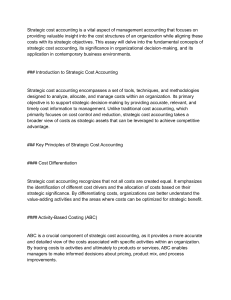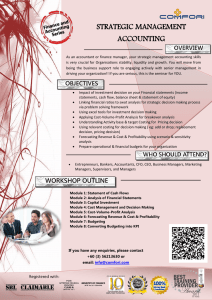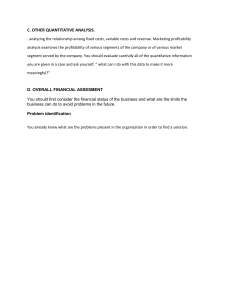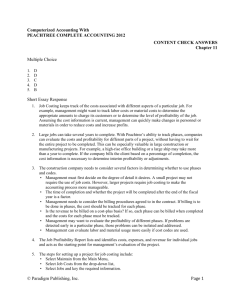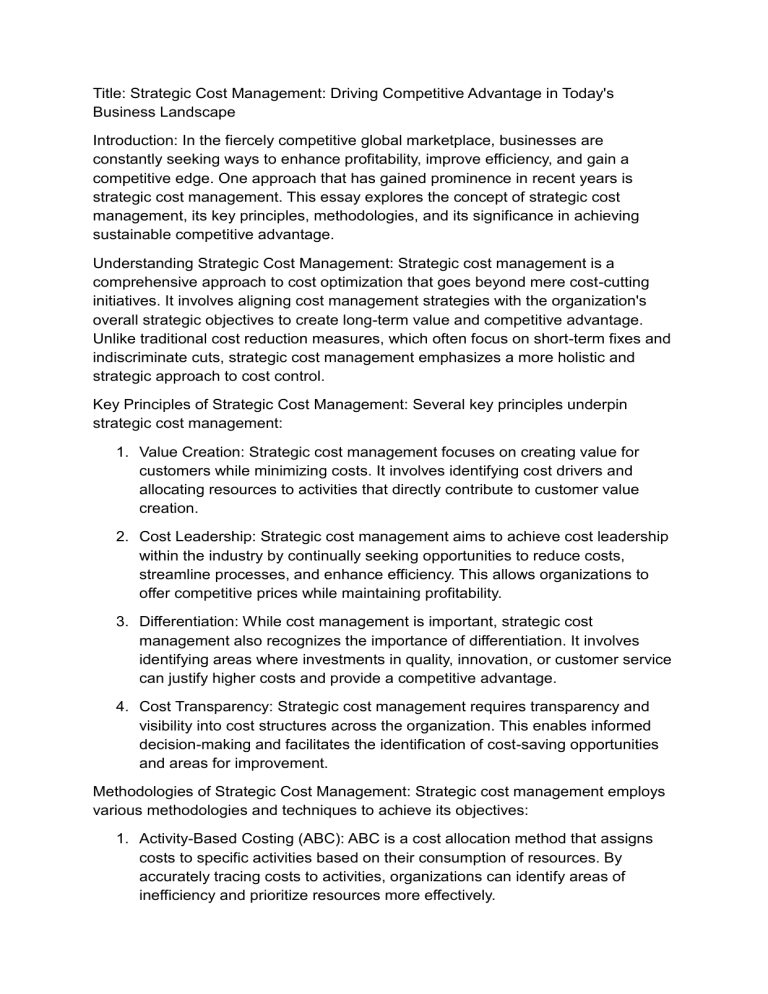
Title: Strategic Cost Management: Driving Competitive Advantage in Today's Business Landscape Introduction: In the fiercely competitive global marketplace, businesses are constantly seeking ways to enhance profitability, improve efficiency, and gain a competitive edge. One approach that has gained prominence in recent years is strategic cost management. This essay explores the concept of strategic cost management, its key principles, methodologies, and its significance in achieving sustainable competitive advantage. Understanding Strategic Cost Management: Strategic cost management is a comprehensive approach to cost optimization that goes beyond mere cost-cutting initiatives. It involves aligning cost management strategies with the organization's overall strategic objectives to create long-term value and competitive advantage. Unlike traditional cost reduction measures, which often focus on short-term fixes and indiscriminate cuts, strategic cost management emphasizes a more holistic and strategic approach to cost control. Key Principles of Strategic Cost Management: Several key principles underpin strategic cost management: 1. Value Creation: Strategic cost management focuses on creating value for customers while minimizing costs. It involves identifying cost drivers and allocating resources to activities that directly contribute to customer value creation. 2. Cost Leadership: Strategic cost management aims to achieve cost leadership within the industry by continually seeking opportunities to reduce costs, streamline processes, and enhance efficiency. This allows organizations to offer competitive prices while maintaining profitability. 3. Differentiation: While cost management is important, strategic cost management also recognizes the importance of differentiation. It involves identifying areas where investments in quality, innovation, or customer service can justify higher costs and provide a competitive advantage. 4. Cost Transparency: Strategic cost management requires transparency and visibility into cost structures across the organization. This enables informed decision-making and facilitates the identification of cost-saving opportunities and areas for improvement. Methodologies of Strategic Cost Management: Strategic cost management employs various methodologies and techniques to achieve its objectives: 1. Activity-Based Costing (ABC): ABC is a cost allocation method that assigns costs to specific activities based on their consumption of resources. By accurately tracing costs to activities, organizations can identify areas of inefficiency and prioritize resources more effectively. 2. Target Costing: Target costing involves setting target costs for products or services based on market demand and desired profit margins. It requires close collaboration between product development, marketing, and operations to design products that meet customer expectations at the target cost. 3. Cost-Volume-Profit (CVP) Analysis: CVP analysis helps organizations understand the relationship between costs, volume, and profits. By analyzing cost behavior and breakeven points, organizations can make informed decisions about pricing, product mix, and resource allocation. Significance of Strategic Cost Management: Strategic cost management is critical for organizations seeking to achieve sustainable competitive advantage: 1. Enhanced Profitability: By effectively managing costs and optimizing resource allocation, organizations can improve profitability and financial performance. 2. Competitive Advantage: Strategic cost management enables organizations to offer competitive prices, differentiate themselves from competitors, and capture market share. 3. Resource Optimization: By identifying and eliminating wasteful activities, strategic cost management helps organizations optimize resource allocation and improve operational efficiency. 4. Innovation and Growth: Strategic cost management frees up resources that can be reinvested in innovation, product development, and growth initiatives, driving long-term competitiveness and success. Conclusion: In conclusion, strategic cost management is a fundamental aspect of modern business strategy, enabling organizations to achieve sustainable competitive advantage in a dynamic and challenging business environment. By aligning cost management strategies with overall strategic objectives, organizations can enhance profitability, improve efficiency, and drive innovation and growth. As businesses continue to face evolving market pressures and uncertainties, strategic cost management will remain a critical tool for achieving success and maintaining competitiveness in the long term.
